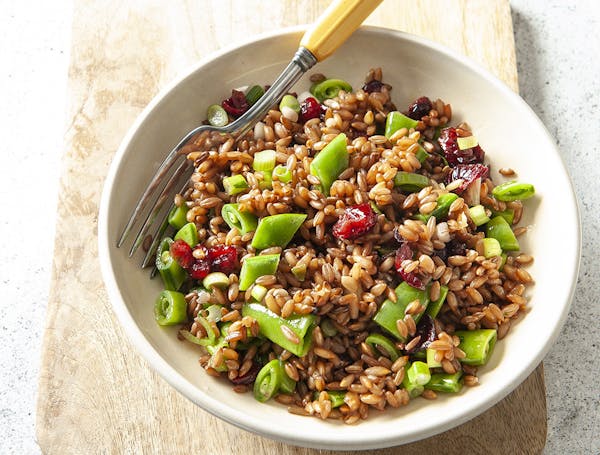Rye, like barley and oats, is an ancient grain that's perfect for today's kitchen. Years ago, it grew prolifically across this region. Then it was replaced by corn and soy beans, but now it's making a comeback.
And no wonder. Rye berries — whole kernels of rye — are flavorful, dense and more substantial than rice or pasta. They will retain their integrity when made ahead. Hearty and comforting, rye berries make a satisfying salad, words I don't often associate with the usual side dish.
Rye is extraordinarily hardy and easy to grow organically because it thrives in our cold, wet, short season. When rotated in with other crops, it helps protect the land. Because it's deep-rooted, it can withstand extreme weather, retain water and prevent nutrient runoff. Growing whole grains such as this builds richer, healthier soil for growing food for generations to come.
In my kitchen, whole-grain salads are spur of the moment meals that just seem to happen. You really don't need a recipe, just fresh vegetables, or tasty leftovers — roasted vegetables or sautéed greens, grilled chicken or poached salmon or pan-seared pork chop. Whisk up a quick vinaigrette, and you can pull things together for a dinner that is ready faster than calling for takeout, and fresher, too.
Cooking whole grains is so very easy because, unlike pasta or white rice, they do not require precise quantities or tricky timing. While rye, barley and oats don't taste the same, they all act pretty much the same in the pot. All you need to do is to cover them with abundant salted water and simmer them until tender but still chewy. Rye berries need about 35 to 40 minutes, and if there is water left in the pot after cooking, simply drain it off.
Once you've cooked the grain, make sure it's dry before tossing in the dressing to avoid a watered-down combination. Drain the cooked grain in a colander and then spread the grain out on a baking sheet for several minutes before using in the salad.
Rye berries have an earthy, almost nutty flavor profile that's milder than rye bread. They are best dressed with assertive vinaigrettes using strong acids — apple cider, red wine, or sherry vinegar; for oil, try hazelnut or sunflower oil to complement the nutty quality. I don't keep rye berries on hand because they're good for you. I love them because they taste so good.
Beth Dooley is the author of "In Winter's Kitchen." Find her at bethdooleyskitchen.com.






